(Spoiler alert: this post contains spoilers for King’s Quest III: To Heir Is Human and the whole series so far. But you really should have played it by now, shouldn’t you?)
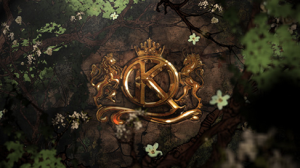
With the recent announcement of Sierra’s resurrection as a collaboration between Activision and independent developers, and the accompanying announcement that The Odd Gentlemen is developing the first King’s Quest game since 1998, there has been a flurry of fan speculation, a mix of anticipation and apprehension. But what we know for certain is this: the game will be an adventure game featuring King Graham’s granddaughter, who is apparently named Gwendolyn.
At first brush, the name Gwendolyn seems adorably apropos for Graham’s granddaughter. No word yet on whether Gwendolyn is Rosella’s or Alexander’s child, but my bet is on Alexander née Gwydion, because tracing the line from Graham to Gwydion to Gwendolyn is satisfying in the way that only alliteration can be. But even if Gwendolyn is Rosella’s child, the Gwydion/Gwendolyn connection in the names makes for a warm, affectionate nod for fans who recognize it.
Except that it actually might not be so cozy. Allow me to explain.
Working from Alexander’s perspective, of course, we can hardly imagine that he would want to give his daughter, or have his niece given, a name that would remind him of his experience as Manannan’s slave-boy Gwydion. We see him take up the name Alexander pretty much as quickly as he knows that it’s an option, and we never see him look back with any fondness on the name Gwydion. It doesn’t seem likely that anyone in the royal family would want to celebrate the name Gwydion. Sure, Gwendolyn sounds like Graham, but it sounds even more like Gwydion.
And that similarity carries through outside the game-world of Daventry and its surrounding lands, too. Gwendolyn and Gwydion are very obviously Welsh names; Graham is English. I’ve talked about the problem of medieval English colonialism in games before. It seems to me that, when we consider Gwydion’s transformation into Alexander with consideration of national origins of names, King’s Quest III is a prime example of how colonial ideologies of the past can be fossilized in fantasy, remaining unexamined in the present because the colonialism is so normalized that it is invisible.
There is some uncertainty about the origins of the English word Welsh (the Welsh term for Wales is Cambria, and has a completely different meaning), but it’s generally agreed that it is from the Old English term wealh, which means variously foreigner or slave. In effect, as the English moved into Britain, pushing the Celtic peoples who were there already further west, we see the Welsh being called foreigners what was their own land. Moreover, that slave-boy Gwydion in King’s Quest III was given a Welsh name seems either an unfortunate accident of etymology or a knowing wink to the colonial past of Wales, from which so many of western fantasy’s oldest narrative structures originate. Given that Celtic names of all kinds make their way into fantasy frequently, we could attribute the name Gwydion (and subsequently Gwendolyn) to an accident of genre.

In fact, given Roberta Williams’s interest in Celtic folklore, it’s very likely no accident that Gwydion, the first King’s Quest playable character to knowingly perform magic from a spellbook, takes on the name of a mischievous and powerful magician from the Welsh Mabinogion. In the fourth branch of the Mabinogion, Gwydion and his brother Gilfaethwy conspire together to commit rape, and are transformed into stags as punishment; Gwydion seems to learn his lesson and fosters a boy abandoned by his disgraced mother, using trickery and magic to see that the boy prospers. Although Gwydion, son of Graham, distinctly has his own story apart from Gwydion, son of Don, the resonance of magic and trickery and even imposed shape-shifting as punishment (given Manannan’s creative punishments for disobedience) are quite evident.
But what makes Gwydion particularly interesting is that he doesn’t stay Gwydion for very long. As soon as the player manages to cast Understanding the Language of Creatures, which is available very early in the game, the birds inform him that Gwydion is, in fact, the long-lost prince Alexander of Daventry—a classical imperial name in a very Englishy kingdom—and this is assumed to be Gwydion’s “true” identity (although the narrator, for reasons of both technological limitation and possibly spite, persists in calling him Gwydion). Upon learning that his name is Alexander, the goal of the game ceases to be to free Llewdor from the oppressive wizard (quickly done by transforming him into a cat), but rather to leave Llewdor and assume Alexander’s rightful place by rescuing his sister from a dragon and restoring peace to Daventry. Llewdor’s needs are completely eclipsed by Daventry’s needs, and Gwydion’s identity by Alexander’s.
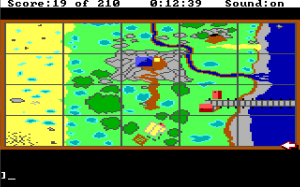
Furthermore, Llewdor’s politics and geography establish it as a lawless border region, a view that seems imported from medieval English representations of Wales. The (magic) map of Llewdor shows it clearly as a fertile, but wild, border strip between an ocean and a desert—two completely inhospitable spaces that are inhabited only be deadly wildlife and mythological monsters. Llewdor itself is barely hospitable; the most civilized creatures in it seem to be the gossipy birds and squirrels. Aside from the shopkeeper and the barmaid at the dock, every other resident Gwydion encounters in Llewdor is a lawless threat—bandits, pirates, anthropomorphized animals, and mythological monsters. Although Manannan’s removal is celebrated (briefly), the power vacuum it leaves is never addressed. Apparently Llewdor, lawless frontier that it is, doesn’t need a ruler.
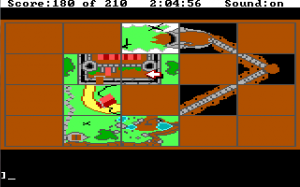
By contrast, the inabitants of Daventry are lawful, if a bit eccentric (save for the dragon, of course). They generally recognize the human King Graham’s authority, even when they have their own kings (as seen in King’s Quest I), reminiscent of the idealized “high king” concept of a unified Britain—a notion taken from Celtic practice, but assimilated into English narrative to assert dominance over the Celtic peoples. Indeed, we do see Graham and Alexander functioning in later games as peace-makers, frequently negotiating alliances for Daventry in less lawful lands.
Leaving Llewdor, since it’s a borderland, is simply a matter of walking too far. Llewdor has no clear boundaries; it just fades from habitable to uninhabitable, existing as it does as a border space between two incompatible spaces (ocean and desert). To be certain, leaving Llewdor is often fatal, but Llewdor itself is not much more hospitable. Daventry, however, centered as it is amid uninhabitable space, is clearly marked; once the player enters Daventry, it is impossible to exit. In every other King’s Quest game in which Daventry is a playable space, leaving Daventry requires either mountain climbing or supernatural intervention, and is always supremely perilous, although Daventry itself—once brought properly under the crown’s rule again in King’s Quest I—is a relatively safe space.
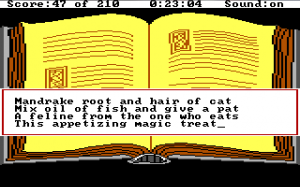
The contrast between Llewdor and Daventry seems to align too neatly with medieval English characterizations of Wales—as well as modern characterizations of old Celtic cultures. Llewdor is a lawless place where heroism and trickery are possible; Daventry is the lawful center that seldom actually sees heroism (it’s only a playable space in King’s Quests I, III, and Mask of Eternity) because it is simply too peaceful. Furthermore, Llewdor is a more magical and poetic place than Daventry—it is inhabited by an oracle and dominated by a wizard, and it is the first space where a member of the royal family of Daventry can actually cast spells successfully, for instance.
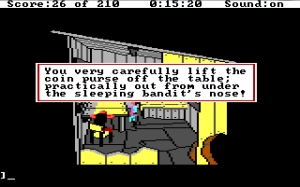
As the rebellious slave Gwydion, the player character freely participates in the lawlessness of Llewdor—he has, in effect, “gone native”; as Prince Alexander of Daventry, however, the player character is merely courtly. While in Llewdor, Gwydion plays a trickster role, stealing whatever he needs and besting the natives at their own lawlessness—robbing from robbers, enchanting enchanters, and pirating pirates. He’s better at being Llewdorian than Llewdorians, but of course, in proper colonial logic, that’s because he’s from Daventry but raised in Llewdor. However, later games demonstrate that his contact with lawless borderland Llewdor has left him not completely capable of integrating into Daventry court society. Although he acculturates quickly, trouble follows him from Llewdor—Manannan’s vengeful brother visits a removal of the entire court upon Alexander’s family, and Alexander seems to spend little time in Daventry before departing more or less permanently for the Land of the Green Isles, another wild borderland with strong Orientalist features.

Will Gwendolyn, like Gwydion, be roguish and trickstery like Gwydion? We can only hope; playing as Gwydion is just fun. Will Gwendolyn also exist in border spaces, as Gwydion/Alexander has? The name might suggest so, but of course only The Odd Gentlemen can tell at this point. But what is certain is that the name Gwendolyn, like Gwydion and Llewdor before, seems to be perpetuating medieval colonial attitudes, as so much of fantasy does.
And what’s the harm in some medieval colonialism, anyway? The harm is certainly less than other colonial representations in video games; this is true. But it is a convenient colonial myth to say that the colonized people no longer exist and therefore their cultures and mythologies may be freely plundered for the colonizer’s fantasies. The idea of Celtic material—particularly Welsh material—as an open resource for all of the fantasy genre is exactly such colonial logic, as it reasons that the material is free for anyone to use now that it has been plundered by the colonizer. But in so doing, we forget that the colonized are still with us. There are still tensions between the Welsh and the English. Is King’s Quest then being postcolonial by illustrating such a tension? Possibly. The trouble with colonial and postcolonial narratives is that they often look similar, and they do so on purpose as each appropriates the other for its purposes. But I suspect that what we see in Gwydion—and Gwendolyn—is merely a convention of fantasy that has fossilized medieval colonialism, one that moderns fail to recognize even as they participate in it because, well, it’s only fantasy; it’s only a game.

Hats off! It’s easy to forget (well, maybe not for the Irish) that the colonial experiments of the English began in their own backyard. Kudos for finding a thread working back to practically fossilized subject matter and managing to coax out some fresh criticism.
Rowan, thank you for your comment! You’re right to note that these things are most visible in the Irish relations with the English, which is why I’m enjoying looking at other marginalizations too.
However, to be fair I’m not the only one who has noted that postcolonial theory can be applied to both medieval material and medievalism in modern culture. If you’re interested in seeing what some bonafide medievalists say on the matter, I recommend reading works by John Dagenais and Margaret Greer, Catherine Brown, Bruce Holsinger, or Jeffrey Jerome Cohen. But it is a major thrust of my dissertation research, as I’m interested in how modern medievalized fantasy functions as genre and ideology.
I was a huge Kings Quest fan and I thoroughly enjoyed reading this. I’d love to see more analysis of the Kings Quest series if possible!